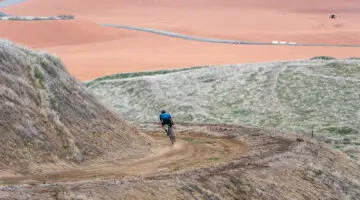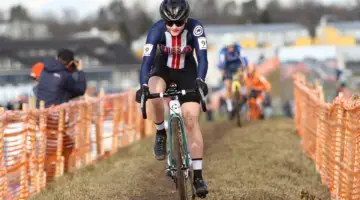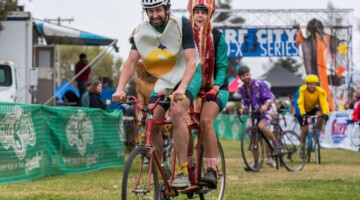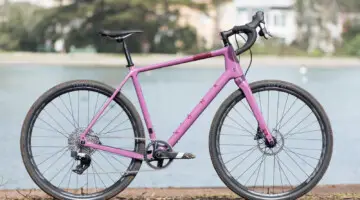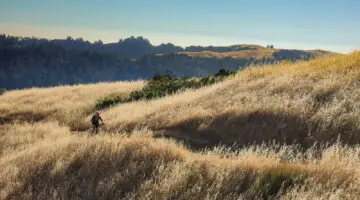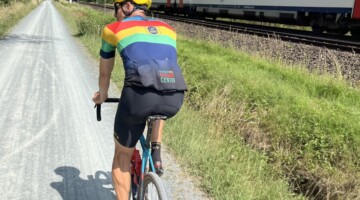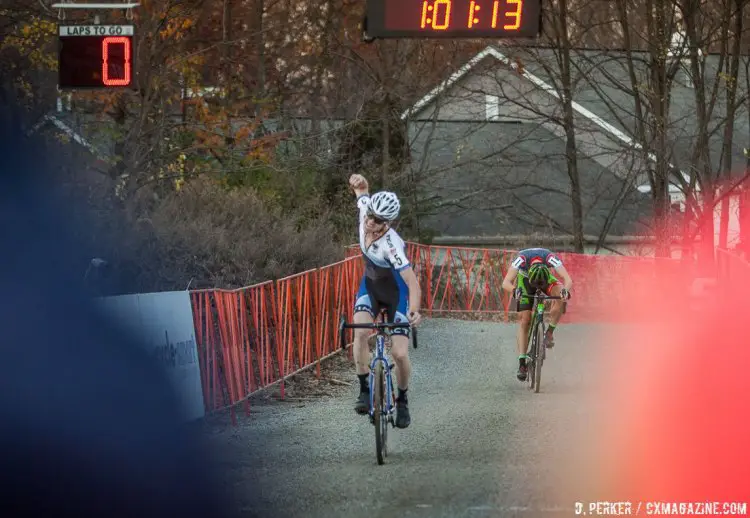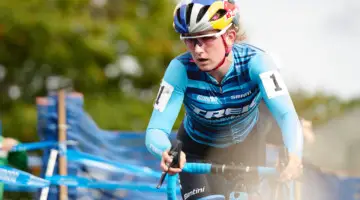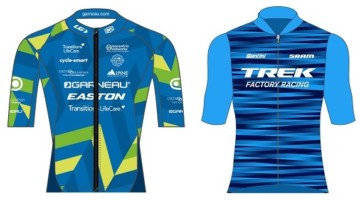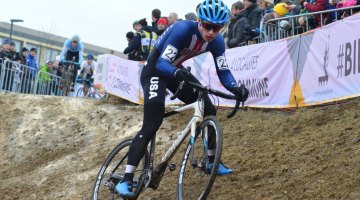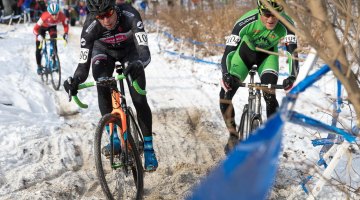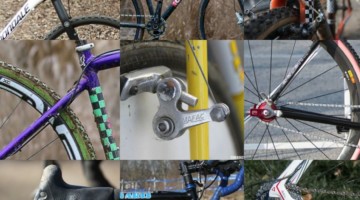When Jack Kisseberth of the JAM Fund team lines up at the 2017 Cyclocross World Championships in Bieles, Luxembourg, by almost anyone’s standards, he’s already won. Reaching such a level in only his third season of cyclocross, while holding down a full-time job, would be a tremendous victory for any of us.
Just two years ago, at the 2015 Cyclocross National Championships, in his first full season of cyclocross, Kisseberth slid to a muddy second place in the Division II Collegiate race, competing for Tufts University. It was an impressive result for a first-year racer from a school not known as a cycling powerhouse. We interviewed him after his race, and after that eye-catching result, I personally messaged the up-and-coming racer to congratulate him on his podium and make a fellow Jumbo connection.
Since that result, we’ve watched Kisseberth continue flying up the learning curve of cyclocross, securing a spot on the JAM Fund team, landing a UCI podium as a first-year Elite at NBX last season, and in his second season of cyclocross, ending the 2015/2016 season with an 11th in the Elite Men’s race at Nationals in Asheville.
This season, Kisseberth started the season off slowly, with a couple early DNFs and two top thirty finishes in Rochester, but once November rolled around, the Northampton-based racer began an impressive run, never finishing outside the top three in UCI races and winning Supercross in New York. At the first day of Nationals, Kisseberth continued that hot streak, taking the non-title Men’s 23-39 race as a pre-Nationals opener.
Still, when Kisseberth crossed the line in fourth in the Elite Men’s race at the 2017 National Championships in Hartford a few days later, heads turned and fans at the venue and at home asked, “Jack who?”
I caught up with Kisseberth before he left for Worlds to offer Cyclocross Magazine readers an answer to that question. Here’s a portion of that interview.
Cyclocross Magazine: A couple years ago, after Austin Nationals, I reached out to you because personally, I was super excited to see a fellow Jumbo in cyclocross and on the podium. I’m curious if at that time you had any inkling that a cyclocross career or a world championships start might be in your future?
Jack Kisseberth: I definitely didn’t think it was going to happen this soon. It was something I was thinking about as a long-term future goal, if I kept at it. It was my first year, in Austin was my first year in cyclocross, so I really had pretty low expectations for what was coming in the near future. I knew that I had some talent in it because I was able to, in the first year, get up there. So yeah, but I definitely didn’t think by this time I would be on the Worlds Team.
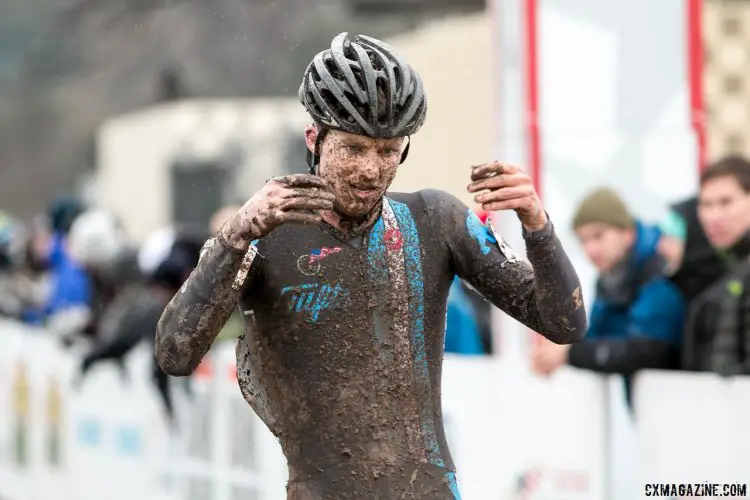
Jack Kisseberth attempts to regain feeling in his hands after a strong ride to finish second in the D2 Collegiate 2015 Cyclocross National Championships. © A. Yee / Cyclocross Magazine
CXM: That must be one of the fastest trajectories to the Worlds team we’ve ever seen.
JK: Yeah, I definitely surprised myself. Even by the beginning of the season I was pretty far off from where I am now. It’s been a quick progression this year, which I’m really happy about.
CXM: That’s great. Yeah, I think you surprised a lot of people in Hartford. Even though you had some podiums and a UCI win at Supercross, I don’t think you were on a lot of people’s shortlist for top five.
JK: Right. By the end of the season my goal was top five at Nationals. I knew judging from where I was finishing in some of the C2s around New England against some really fast people, I could sort of contend to be up there with a good ride. I knew that the conditions in January in New England could be pretty iffy, which could work out for me because it might be a little more technical, which suits me.
CXM: It seems like you excel in sloppy conditions. Is that what you look forward to?
JK: Yeah, I think just because my background is in mountain biking, the technical side of things has always been my strength in cyclocross. I only started road riding and really training junior year of college. That’s definitely my main limiter at this point and the big thing I’m working on. So any sort of technical course where there’s a little bit less power, I can hang with some guys who usually I won’t be able to keep up with. Since the past few years working with the JAM Fund, that’s definitely been the focus of what we’ve been working on. Getting the power up and working on some strength training. It’s definitely coming along, which is awesome.
CXM: It appears to be working for sure. So are you coached by Al Donahue?
JK: Yeah, I’m coached by Al who is the “A” in JAM Fund.
CXM: You have a cyclocross-racing housemate too?
JK: I’m roommates with Stephen Hyde, so he definitely acts as a coach a lot of the time as well. It’s a good influence to have and it’s awesome living with him because he’s sort of someone I can always emulate, and whatever he’s doing, try to do [that] because it obviously works. I also ask questions nonstop about what kind of rides I should be doing, the nutrition side of things, strength training. Just sort of any aspect of the sport he does [I can use as a] reference as right. He’s just one room down from me.
CXM: Yeah, that’s great.
JK: That’s been huge.
CXM: You guys train a lot together?
JK: Yeah, we definitely go on some rides together. He’s been in Europe, but he’s been out this ’cross season. When he’s back here, we’re riding together and going to the gym together.
CXM: Sweet. At one point in Hartford you were sitting in second place behind Hyde, right? What was going through your mind at that time?
JK: Yeah, definitely, I think I [moved up to second] on that big off-camber section. I rode the top line and got in front of Kerry [Werner]. I think Tobin [Ortenblad] at the time was in second or third. It totally surprised me because I wasn’t…It’s not like I was gunning for a win at that point, it was not even in the back of my mind. I was just trying to ride consistently. Sitting all of a sudden, 20 minutes in, right behind Stephen, it was a major adrenaline boost. The next lap, I sort of went a little too deep into the red trying to keep up with him and I paid for it a little bit on the following lap. I had a couple crashes and was sort of falling all over the place.
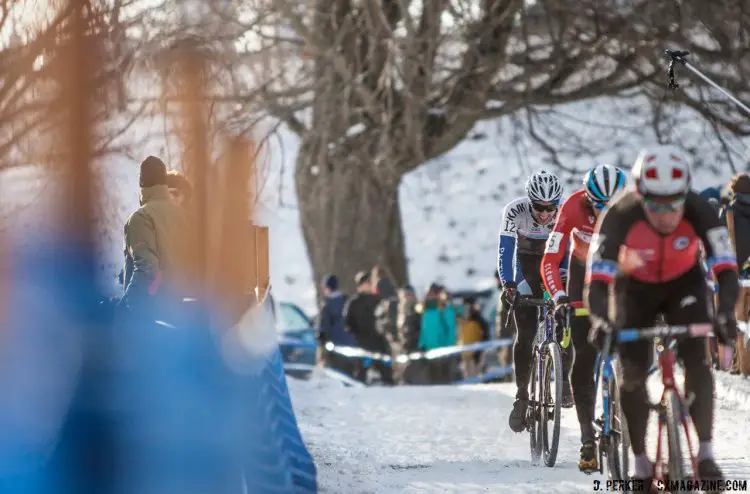
Three generations of New England-based cyclocross stars. Jonathan Page, James Driscoll and Jack Kisseberth rode their way into 6th, 2nd and 4th places respectively. Page and Driscoll now live in Utah. Will Kisseberth end up there in ten years? 2017 Cyclocross National Championships, © D. Perker / Cyclocross Magazine
I decided to drop it down a sec and sort of settle into a more comfortable pace where I could still nail the lines and didn’t worry about Kerry and Driscoll passing me because I know they’re fast dudes. I knew that if I was going to keep that same pace up I would probably go way too deep and not be able to recover. I just settled in and tried to ride smooth the rest of the race. Yeah, it was definitely a great race.
CXM: Then when you crossed the line in fourth, how excited were you by that result?
JK: I could see [Tobin] breathing down my neck for the whole second half of the race so I was constantly put under pressure to keep it up, and if I messed up a line he would be right there. Just being able to hold him off—he’s a super strong rider, and super strong technically—I was just so excited to get to the top five, which had been my goal.
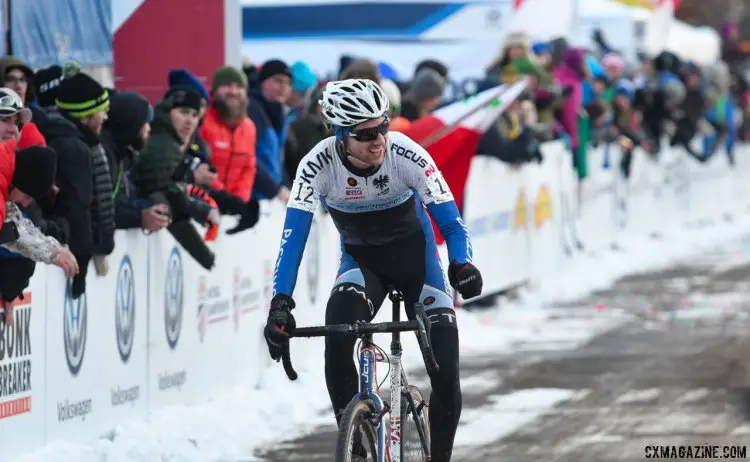
Jack Kisseberth excited with his fourth place finish, and first finisher with a full-time job outside of cycling. 2017 Cyclocross National Championships. Elite Men. © A. Yee / Cyclocross Magazine
CXM: That’s awesome to achieve your goal. You studied economics Tufts, is that right? And now work at New Balance?
JK: Yeah, economics at Tufts, and I started working [at New Balance] right after graduating a couple years ago. Since this past cyclocross season I’ve been working remotely which is really helpful in traveling to races and sort of having a more flexible work schedule so I can work on my biking. The New Balance guys have been really cool about letting me keep this side of my life going. It’s still a full-time job and still definitely have a decent amount of work to do but it has a flexibility to incorporate the biking.
CXM: Right. What is your job there? What do you do?
JK: I do data analytics and I work on paid digital content media.
CXM: How do you balance the two, like working and racing? Do you have to take off a lot of time for Nationals or Worlds?
JK: No. Yeah, working remotely with the flexible work schedule I sort of find time to work later in the evening after I’ve gotten my training in, early in the morning before my training. For right now, they complement each other nicely. It sort of gives me another side of my life that distracts me so it’s not 100% biking and training all day long. It just sort of keeps everything balanced. I definitely have to be efficient with my time because [there’s] a lot on my plate but it’s been working so far, so I’m going to keep on, keep on going.
“[My job] sort of gives me another side of my life that distracts me so it’s not 100% biking and training all day long. It just sort of keeps everything balanced. I definitely have to be efficient with my time because [there’s] a lot on my plate but it’s been working so far so I’m going to keep on, keep on going.”
CXM: Yeah, I guess that was my next question. You live with Stephen Hyde who is a full-time pro. Do you ever say to yourself, “If I could just focus on this I could have…or I would be even better if…?”
JK: Yeah, my goal is to get a pro contract soon. I want to make biking my full-time job but it’s great at this point in time still having a job that I’m interested in and it sort of relieved that financial pressure that most people trying to become full-time pros are stuck in. I’m still able to live comfortably while I’m training and trying to make the jump up to the pro level. The goal in the future is to make it my job, to bike.
CXM: Makes sense. That’s what JAM Fund has really been successful at doing, yeah? We’ve seen Stephen Hyde, Ellen Noble and Anthony Clark among others move on to pro contracts.
JK: Yeah. I mean, there’s definitely an expectation to give it 100% and make the jump up to a full-time pro in a few years. They don’t put a ton of pressure on you day-to-day to make it happen but there’s definitely a sense in the JAM Fund community that you’re going to go 100% into this and you’re going to really do all it takes to make it to the next level. They have the support, obviously, and the knowledge to make it happen so it’s really a perfect situation for me.
CXM: That’s very cool. Finishing fourth at Nationals I mean, you finished ahead of Jeremy Powers, one of the founders of JAM Fund, and then Anthony Clark, one of many famous JAM Fund alumni, how does it feel to be already ahead of those guys? Is it kind of surreal?
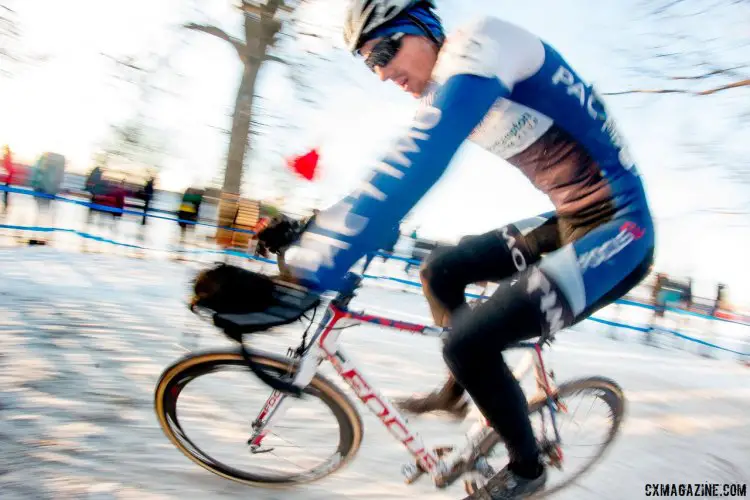
Jack Kisseberth on his way to fourth at the 2017 Cyclocross National Championships. Elite Men. © A. Yee / Cyclocross Magazine
JK: It’s definitely surreal. It’s still one race, and everyone has bad races, and not all the conditions suited everyone’s strengths so it’s not like I feel like I’m a better bike racer than Jeremy Powers now by any means. He’s still so much stronger than I am and they have so much more knowledge. I’m not letting it get to my head that this is where I am all the time but it’s definitely…it’s a move in the right direction and hopefully next year we can keep on progressing and have this be a more usual result for me, not a standout result.
CXM: Sure. You’re coached by Al Donahue, you have a housemate in Stephen Hyde, and then with Jeremy Powers being one of the founders of JAM Fund, is he also an adviser and kind of a mentor to you as well?
JK: Yes, definitely. There’s a whole community behind JAM with all the alumni, with Stephen Hyde, with Jeremy Durrin, with Anthony Clark, all these guys who have gone on, Ellen Noble, to be successful. Then obviously Jeremy and Al are sort of the pillars of the company and the team. It’s just there are so many resources and everyone works together, and the goal is for everyone within the organization and within the team and the community to excel and improve. There’s not really one person who I’m only reaching out to and one person who is helping me. It’s sort of a big group effort. I think that’s what’s really special about the team. I don’t think there are many small towns that have this much talent and this many resources anywhere in the U.S. You go down the street and it’s Jeremy Powers’ house. You go down the street and it’s Jeremy Durrin, and living with Stephen Hyde. Everyone’s sort of right here.
“It’s still one race, and everyone has bad races, and not all the conditions suited everyone’s strengths so it’s not like I feel like I’m a better bike racer than Jeremy Powers now by any means. He’s still so much stronger than I am and they have so much more knowledge.”
CXM: That’s pretty cool. With Stephen Hyde and Jeremy Powers both in your back pocket, you have the most sought-after situation it seems. You kind of have the two best cyclocrossers in the nation right at your disposal.
JK: Yup. It keeps your ego in check when you go out on a ride and you’re riding a cyclocross course and usually in any other part of the world you’d be much better than everyone else in the town, but you’re just getting destroyed on sand sections or run-ups. It keeps you modest and keeps you driven to sort of perform as they have, and you see what they’re doing, what their daily life is like, and what it takes to be a top professional in the U.S. You have all the tools you need to make it. It’s just about putting in the work.
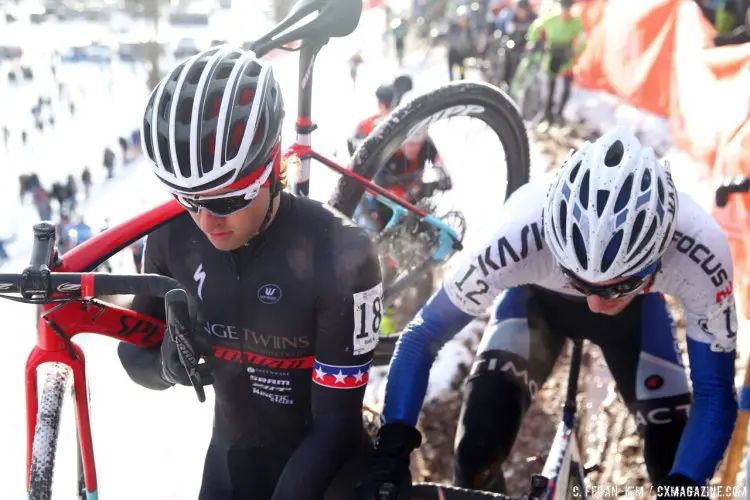
Using all his tools, Kisseberth rode aggressively in Hartford to get up to the front, battling with Cody Kaiser for the right line, and taking the high line. 2017 Cyclocross National Championship, Elite Men. © C. Fegan-Kim / Cyclocross Magazine
“It keeps your ego in check when you go out on a ride and you’re riding a cyclocross course and usually in any other part of the world you’d be much better than everyone else in the town, but you’re just getting destroyed on sand sections or run-ups. It keeps you modest and keeps you driven to sort of perform as they have, and you see what they’re doing, what their daily life is like, and what it takes to be a top professional in the U.S.”
CXM: That’s great. Two of the three guys in front of you in Hartford, Jamey Driscoll and Kerry Werner, they’ve both won collegiate titles. In Austin you were right there in second in the DII race. If a young Junior was listening to our interview and had hopes of making it as a cyclocross pro, would you recommend them going to college and racing collegiate, and having the whole college experience and degree, or if they had an opportunity, go straight into the pros?
JK: I think it definitely makes sense to, for me, I can’t speak to everyone, but for me it made sense to go to college and have this other focus. At the time, I didn’t even…when I entered college it wasn’t a decision for me whether or not I would go to the pro level or go to college. I was still just riding bikes purely for fun and not really racing at all. Looking back on it now, I think keeping bikes as fun…participating in any bike related activity was always because it was the only thing I ever wanted to do. It’s what I loved to do and every day I would look forward to getting out of school so I could go ride bikes, and ride trails.
A lot of time you see people who do this for many years starting as Juniors, they just get burnt out. I’ve been in a nice situation where [biking has been] the only thing I wanted to do. The hardest part of the year is when I have to take a two week or three-week break from biking. Keeping it fun and making sure you’re doing it because you want to do it, I think, is the most important thing as a Junior or someone developing.
“The hardest part of the year is when I have to take a two week or three-week break from biking. Keeping it fun and making sure you’re doing it because you want to do it, I think, is the most important thing as a Junior or someone developing.”
CXM: As a lifelong cyclist and now a dad, I can relate to that. You were riding your mountain bikes but were you even aware of the sport of cyclocross while you were in high school or middle school? Had any sense of the rich history the Bay Area has in cyclocross, including the first USCF National Championships and the only five-time men’s champ?
JK: I had absolutely no idea what cyclocross was until I went to college. I had a buddy at Tufts who had raced some cyclocross and he sort of told me about it. I actually went to Gloucester as a spectator, I think sophomore year. That was the first time I’d ever seen a cyclocross race or really seen what it was about. It was a late introduction to the sport. When I saw it in college after just riding road for so long I was like, “I need to do that…I need to get back offroad, I’m tired of just road racing in college in Boston.” Yeah, that’s when I bought my first cyclocross bike and spent the next year racing.
CXM: You mentioned your first cyclocross bike back then was an eBay special. What was it and do you remember much about it? Do you still have it?
JK: Yeah, I still have the bike, the parts are probably scattered about. It was a Scott aluminum cyclocross bike, $800 and it was pretty worked from day one. Cyclocross bikes are fairly simple so you can get by on an $800 beat-up cyclocross bike.
CXM: Totally. Like we all say, “Run what you brung.” Right? I even saw young juniors on BMX bikes in Hartford, which is pretty cool.
JK: Especially at lower levels of the sport. I don’t think I could be competing at UCI races with it but I was starting as a Cat 5 racer, it was not a limiting factor in my results. It was nice how there’s such low barriers to entry in cyclocross. It’s a pretty simple machine.
CXM: All right. We share a few things in common, very little really, but a few things. We have a Bay Area connection. We both traveled across the country to attend Tufts, and started collegiate racing on the road in the Cs. We both got our first real exposure to cyclocross in college. But that’s where the similarities end. You’ve gone way farther and I never got any faster. However, Tufts has an interesting history in both cycling, cyclocross, and collegiate racing. I don’t know if you’ve heard, there’s some interesting Tufts Cycling notes: We’ve had an Eastern Collegiate Cycling Conference leader and President of the Board of USA Cycling in Mark Abramson, a pro team doctor and training book author in Mike Ross, a Division II crit champion in Michele Smith, and for a while, a weekly Wednesday night practice on campus that drew out a few pros and national champions. Oh, and a crazy guy who started a cyclocross publication. You’ve added your name to that list in big, bold letters now. How did you choose Tufts and how does it feel knowing that you’ve made some school history? Did you have any idea the school had a collegiate cycling program, or did you know anything about the nearby Middlesex Fells and the great mountain biking there?
JK: I didn’t know all that history. That’s really cool to hear. I chose Tufts because I had some family that lived in Boston so I’d spent some decent amount of time in the Boston area. I knew that I wanted to get out of my little Marin County bubble and wanted to explore somewhere new. Going all the way to Boston was a pretty drastic change but it still felt comfortable and I had family in the area. That was sort of how I found Tufts and why I ended up going there. I didn’t even learn about the Fells until sophomore year.
CXM: That’s a mountain bike and cyclocross bike playground!
JK: Yeah, I know, seriously.
CXM: When I discovered that I thought I was in heaven, once I realized there was great offroad riding so close to campus.
JK: I didn’t have a mountain bike out there freshman year so I was suffering on the road. I didn’t really know too much about the cycling program at Tufts. It was a club team obviously. I met the guys freshman year and it was a really fun group of people and it sort of went along with my previous background of [hanging with] a bunch of people who just like to ride bikes. It’s not super hard core, intense road bike racers. They’re just a bunch of fun people to hang out with and so we would go hang out on bike rides. That sort of made the entry into road biking and this more serious side of the sport doable for me.
CXM: Do you have any involvement or contact with the current team? I’m sure you’re an inspiration to them.
JK: I have some contact. I haven’t talked too much to them but I know some of the guys who are still there riding and I’m also friends with some people who used to be on the team that I’ve stayed friends with while I was there. It’s definitely a part of my life still.
CXM: Awesome. Maybe in the fall you could surprise them with a visit in the fall and do a little cyclocross clinic and just show them what cyclocross is about, create a new generation of Jumbo crossers.
JK: Yeah, I definitely think that’s something that I’ll look into doing. That’s how I got into it…a kid at Tufts telling me about it and convincing me that I should go do it. Showing me what dismounting and remounting looks like. It definitely takes someone to make it look cool and sort of get your foot in the door. I think most people who get introduced into cyclocross stick around and actually continue racing just because it’s such a blast.
CXM: Yeah, man. They would be starstruck if you showed up. That’s great. Last topic, you’ve made the Worlds team, what are the hopes and dreams for the Worlds trip?
JK: I think this Worlds trip, I don’t have any huge racing goals and hopes for finishing spots. Using it more as my first trip to Belgian cyclocross racing and European ’cross racing as I’m just going to try and learn as much as I can, and sort of understand. I’ll be staying with Hyde at the [USA Cycling] house and sort of seeing how his daily routine is there and trying to get as accustomed to European racing as I can [because] next year I’m planning on doing a bigger European block probably in December. Then also after Nationals next year, that will be the time for me to try to focus on getting the really good results. Right now it’s more just enjoy the experience and try to learn as much as I can.
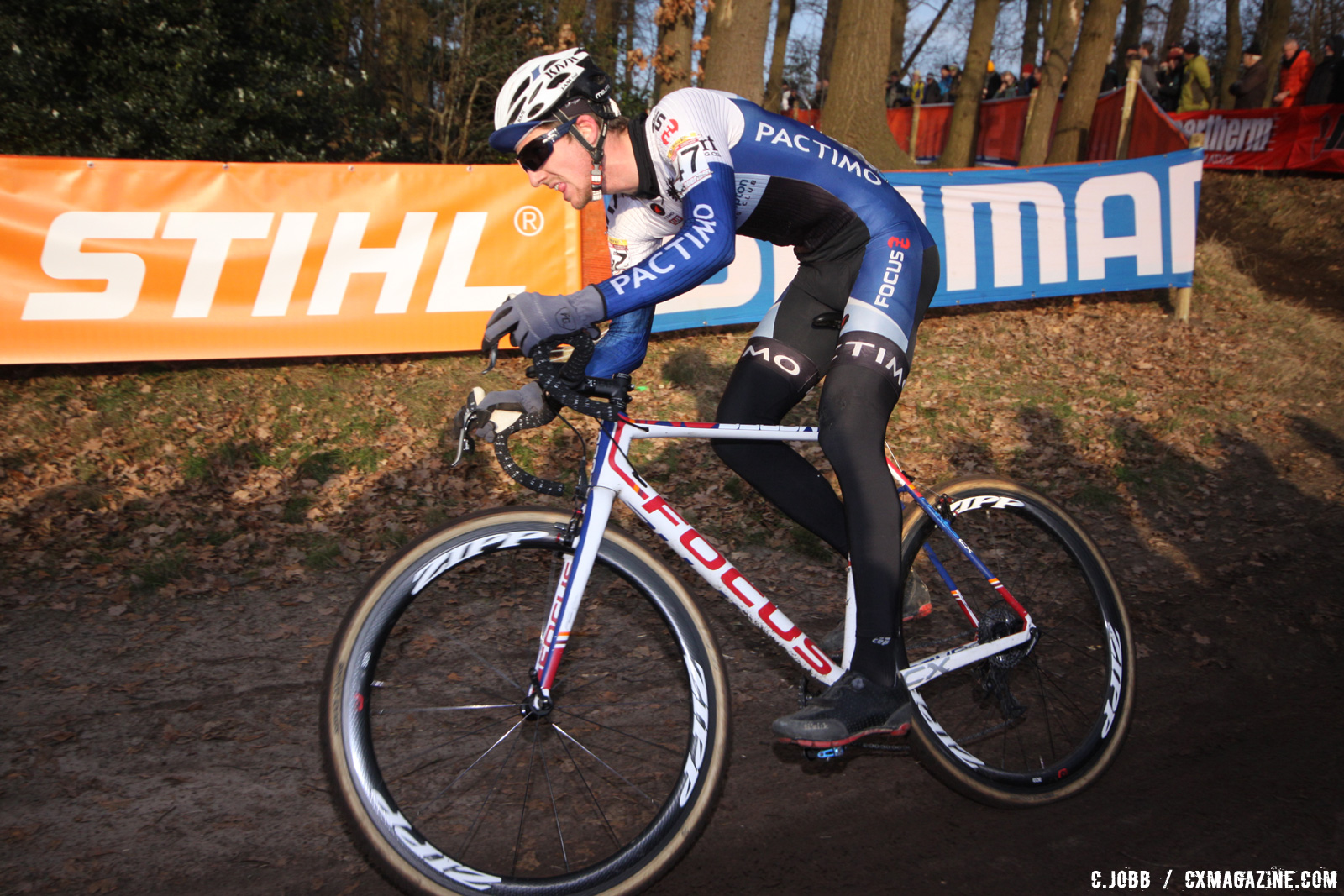
Jack Kisseberth racing his first European race at the 2017 Hoogerheide World Cup, and finished 54th. © C. Jobb / Cyclocross Magazine
CXM: Awesome. Does it feel good though to be heading over there knowing that now you’re teammates with Powers, and Hyde, Werner, Ortenblad, Durrin, all these guys?
JK: Yeah. It’s great knowing some people. I’m sure it will make the transition into briefly living in Europe and racing there much easier. It’s the same group of guys that I hang out with out here so I think that’ll be a big part in making it a fun experience and keeping the Euro racing light.
CXM: So after Worlds you’ll come back and just return to the real world, or any plans to stay and do a few more European races?
JK: I think the plan now is to come back and take my break for the offseason and then get back up into base training and working in for next year. I don’t think I’m going to stay for any of the later races. Hopefully come back, get some skiing in. Enjoy the offseason and then back to the grind.
CXM: Unless you win a rainbow jersey and then can’t pass up all that start money for the other races?
JK: Yeah, we’ll see!
CXM: Well, good luck with Worlds and the trip. Thanks for your time!
JK: Awesome. Thanks, it was good to talk!
Jack Kisseberth raced his first World Cup last weekend in Hoogerheide, finishing in 54th.
See our growing list of pre-Worlds interviews and coverage here, and stay tuned for an expanded feature on Jack Kisseberth in an upcoming, long-awaited print magazine.

